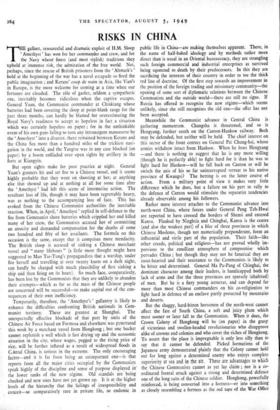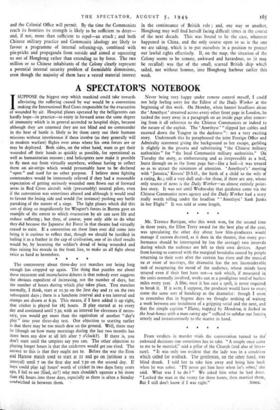RISKS IN CHINA
THE gallant, resourceful and dramatic exploit of H.M. Sloop ' Amethyst' has won for her commander and crew, and for the Navy whose finest (and most stylish) traditions they upheld at immense risk, the admiration of the free world. Not, perhaps, since the rescue of British prisoners from the ' Altmark's ' hold at the beginning of the war has a naval escapade so fired the public imagination ; and Kerans' coup de main in Asia, like Vian's in Europe, is the more welcome for coming at a time when our fortunes are clouded. The role of gaoler, seldom a sympathetic one, inevitably becomes ridiculous when the captive escapes. General Yuan, the Communist commander at Chinkiang whose batteries had been covering the sloop at point-blank range for the past three months, can hardly be blamed for overestimating the Royal Navy's readiness to accept as hopeless in fact a situation which was certainly hopeless on paper ; for in the unthinkable event of his own guns failing to turn any intransigent manoeuvre by the ' Amethyst ' into a disaster, there remained between Kerans and the China Sea more than a hundred miles of the trickiest navi- gation in the world, and the Yangtse was in any case blocked (on paper) by a boom enfiladed over open sights by artillery in the forts at Kiangyin.
But open sights make for poor practice at night. General Yuan's gunners hit and set fire to a Chinese vessel, and it seems highly probable that they went on shooting at her, at anything else that showed up and at nothing at all for some time after the ' Amethyst ' had left this scene of internecine action. The resultant loss of life, though it may have been regrettably heavy, was as nothing to the accompanying loss of face. This has evoked from the Chinese Communist authorities the inevitable reaction. When, in April, ' Amethyst ' replied in self-defence to the fire from Communist shore batteries which crippled her and killed many of her crew, the Communists accused her of committing an atrocity and demanded compensation for the deaths of some two hundred and fifty of her assailants. The formula on this occasion is the same, except that it comprises more mendacity. The British sloop is accused of sinking a Chinese merchant vessel and " many lifeboats " (a little more thought might have suggested to Mao Tse-Tung's propagandists that a warship, under fire herself and travelling at over twenty knots on a dark night, can hardly be charged with much plausibility of first sinking a ship and then firing on its boats). So much face, comparatively, has been lost by the Communists that they are unlikely to abandon their attempts—which as far as the mass of the Chinese people are concerned will be successful—to make capital out of the con- sequences of their own inefficiency.
Temporarily, therefore, the ' Amethyst's ' gallantry is likely to enhance the difficulties confronting British nationals in Com- munist territory. These are greatest at Shanghai. The unexpectedly effective blockade of that port by units of the Chinese Air Force based on Formosa and elsewhere was penetrated this week by a merchant vessel from Hongkong ; but one bucket cannot replenish a well which is fast drying up and the economic situation in the city, where wages, pegged to the rising price of rice, will be further inflated as a result of widespread floods in Chtral China, is serious in the extreme. The only encouraging factor—and it is far from being an unimportant one—is that reports from all the major cities occupied by the Communists speak highly of the discipline and sense of purpose displayed in the lower ranks of the new regime. Old scandals are being checked and new ones have not yet grown up. It is at the higher levels of the hierarchy that the failings of irresponsibility and conceit—so comparatively rare in private life, so endemic in public life in China—are making themselves apparent. There, in the name of half-baked ideology and by methods rather more direct than is usual in an Oriental bureaucracy, they are strangling such foreign commercial and industrial enterprises as survived being squeezed to death by their predecessors. In this they are sacrificing the interests of their country in order to toe the thick red line of doctrine. Of the first step towards an improvement in the position of the foreign trading and missionary community—the opening of some sort of diplomatic relations between the Chinese- CAmmunists and the outside world—there arc still no signs. If Russia has offered to recognise the new regime—which seems unlikely, since she still recognises the old one—the offer has not been accepted.
Meanwhile the Communist advance in Central China is gathering momentum. Changsha is threatened, and so is Hengyang, further south on the Canton-Hankow railway. Both may be defended, but neither will be held. The chief interest on this sector of the front centres on General Pai Chung-hsi, whose armies withdrew intact from Hankow. When he loses Hengyang —and there is nothing to suggest that he is any more willing (though he is perfectly able) to fight hard for it than he was to fight hard for Hankow—will he fall back on Canton or will he switch the axis of his so far uninterrupted retreat to his native province of Kwangsi? The betting is on the latter course of action. From a military point of view it makes very little difference which he does, but a failure on his part to rally to the defence of Canton would stimulate the separatist tendencies already observable among his followers.
Rather more interest attaches to the Communist advance into north-west China, where forces under General Peng Teh-Hwai arc reported to have crossed the borders of Shensi and entered Kansu. Flanked by Ninghsia and Chinghai, Kansu is the centre (and also the weakest part) of a bloc of three provinces in which Chinese Moslems, though not numerically preponderant, form an influential and virile part of the population. Their faith—like other creeds, political and religious—has not proved wholly im- pervious to the emollient atmosphere of compromise which pervades China ; but though they may not be fanatical they arc stout-hearted and their resistance to the Communists is likely to be bitter and determined. General Ma Pu-Pang of Chinghai, the dominant character among their leaders, is handicapped both by lack of arms and (for the three provinces are sparsely inhabited) of men. But he is a fiery young autocrat, and can depend far more than most Chinese commanders on his co-religionists to fight hard in defence of an enclave partly protected by mountains and deserts.
But the shaggy, hard-bitten horsemen of the north-west cannot affect the fate of South China, a soft and juicy plum which must sooner or later fall to the Communists. When it does, the Crown Colony of Hongkong will be (on paper) in the grasp of victorious and swollen-headed revolutionaries who disapprove alike of crowns and colonies and who covet the riches of Hongkong. To assert that the place is impregnable is only less silly than to say that it cannot be defended. Picked formations of the Japanese army demonstrated plainly that the Colony cannot hold out for long against a determined enemy who enjoys complete superiority at sea and in the air. These are advantages to which the Chinese Communists cannot as yet lay claim ; nor is a co- ordinated frontal attack against a strong and determined defence one of the long suits of the Chinese soldier. Hongkong, powerfully reinforced, is being converted into a fortress—or into something as closely resembling a fortress as the red tape of the War Office and the Colonial Office will permit. By the time the Communists reach its frontiers its strength is likely to be sufficient to deter— and, if not, more than sufficient to repel—an attack ; and both Chinese military practice and Communist ideology are likely to favour a programme of internal softening-up, combined with pin-pricks and propaganda from outside and aimed at squeezing us out of Hongkong rather than extending us by force. The two million or so Chinese inhabitants of the Colony clearly represent a potential internal security problem of formidable dimensions, even though the majority of them have a vested material interest in the continuance of British rule ; and, one way or another, Hongkong may well find herself facing difficult times in the course of the next decade. This was bound to be the case, whatever happened in China, and the only course open to us is the one we are taking, which is to put ourselves in a position to protect our lawful rights effectively. If, on the map, the situation of the Colony seems to be remote, awkward and hazardous, so (it may be recalled) was tat of the small, scarred British ship which sailed, not without honour, into Hongkong harbour earlier this week.



































 Previous page
Previous page